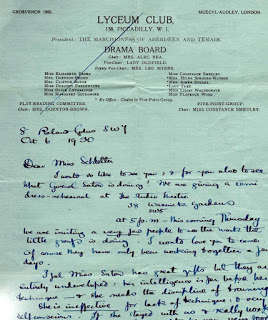 In her sixty six years Constance Smedley (1875 - 1941) managed to pack more into her life than most centenarians would do. Despite being on crutches from her early years and confined from her thirties to a wheelchair (due to some unidentified disability, possibly a hip problem) this Birmingham-born fireball, who married the gay artist Maxwell Armfield, was at various times a crusading feminist, suffragist and journalist, an artist, novelist, playwright, organiser of pageants and folk dances, and perhaps most notably, the founder of the world’s first arts and science club devoted entirely to women.
In her sixty six years Constance Smedley (1875 - 1941) managed to pack more into her life than most centenarians would do. Despite being on crutches from her early years and confined from her thirties to a wheelchair (due to some unidentified disability, possibly a hip problem) this Birmingham-born fireball, who married the gay artist Maxwell Armfield, was at various times a crusading feminist, suffragist and journalist, an artist, novelist, playwright, organiser of pageants and folk dances, and perhaps most notably, the founder of the world’s first arts and science club devoted entirely to women.It is on the notepaper of the London-based Lyceum Club, which the twenty-eight year old Smedley helped to found in 1903, that this featured letter (below) also shows her to be a tireless encourager of talent among women—especially budding musicians and actresses. Here she writes to an actress and fellow feminist Annie Schletter, inviting her to a ‘ semi dress rehearsal ‘where she will witness the enormous promise of a twenty three year old thespian called Gwenol Satow:
‘…I feel Miss Satow has great gifts, but they are entirely undeveloped: her intelligence is far before her technique---& she needs the discipline of training . She is ineffective for lack of technique & is very self-conscious. If she stayed with us & really worked day by day & all day, she might be very, very good.
It is a very hard profession---and she has a great opportunity with us—but I don’t know if she quite realises what a lot of hard work she has to put in, if she is to make good …’
Alas, Miss Satow does not appear to have made the most of her extravagant gifts. In fact, there is no record of her lighting up the professional stage in any way. She became the second wife of the brilliant songwriter David Heneker, also born in 1907, and the composer responsible for such hit musicals as Irma La Douce, Charlie Girl and Half-a-Sixpence. Indeed, Heneker credits his wife for bringing Tommy Steele’s musical into being. According to him she ‘suddenly sat up in bed one night and produced the idea for Half-a-Sixpence ‘. So, in her ninety years perhaps Satow did contribute something to the success of the British theatre, although it is unlikely that Constance Smedley would have been impressed. [RR]

